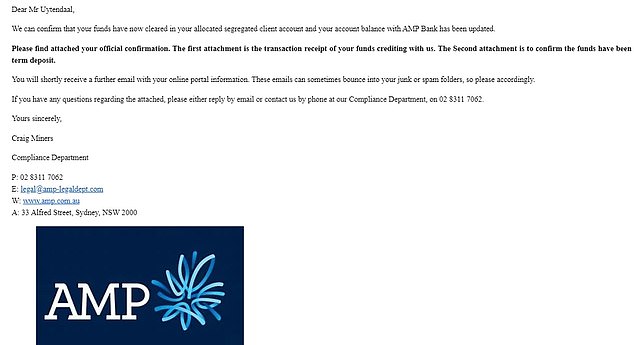A mother and son preparing to build and move into a dual-occupancy home lost the $200,000 they needed due to a sophisticated investment scam.
Mark Uytendaal and his mother, Kerry, bought a 3,000-square-metre property near Lakes Entrance in eastern Victoria to build a home they could share as Ms Uytendaal’s care needs increased.
Mr Uytendaal now lives alone in a shed on the property.
The couple lost a total of $200,000 after investing their life savings in what they believed was a term deposit at financial giant AMP.
Instead, their hard-earned money was transferred to scammers.
Mr Uytendaal and his mother are two plaintiffs in a civil action in the Supreme Court of New South Wales against Hassan Mehdi, the founder of the allegedly fraudulent company Supercheap Security.
The couple was first exposed to the scam in mid-2022, when Uytendaal searched for the best interest rates online.
It was there that he discovered what he thought was a product comparison website with AMP information.
Mark Uytendaal and his mother, Kerry (pictured together), lost $200,000 in an investment scam in 2022
Shortly after using the website, Ms Uytendaal received a phone call from a scammer posing as an AMP employee.
Along with the call, he was sent several fraudulent emails that appeared to be sent from AMP.
Some of the subject lines included “account verification” and “funding information,” while the messages contained fake AMP signatures, logos, and taglines.
“A man called me on the phone with an English accent and then sent me all these documents that looked like AMP documents,” Ms Uytendaal told the The Sydney Morning Herald.
‘This whole thing probably took about 10 days until he finally got me to transfer the money and he didn’t harass me at all.’
Ms. Uytendaal was offered a term deposit with a good interest rate and transferred $100,000 to the newly created “AMP” account.
He then told his son about the deal and he transferred an additional $100,000 into the account.
What the couple didn’t know was that their life savings were actually deposited into Supercheap Security’s bank account and transferred overseas.
They had no idea they had been scammed until several months later.
The horrific reality of her situation only became clear when another victim who lost $500,000, Joanne O’Brien, messaged Uytendaal on Facebook.
A fourth plaintiff in the suit, Judy Fleiter, lost $175,000.

The scammers sent Ms Uytendaal a series of emails (one pictured) about a term deposit while posing as AMP employees.
The two men associated with Supercheap Security are Hassan Mehdi, originally from Pakistan and living in Melbourne, and Ali Waheed, who allegedly evaded legal action by leaving Australia and is believed to be in the Middle East.
Mehdi created the company in 2021, claiming it was to sell security equipment online.
However, Supercheap Security records show that it only made one transaction, worth $152.96, on May 5, 2022.
It remains a registered company in Australia, according to ASIC records.
Mehdi has not disputed that the money was fraudulently taken from the plaintiffs, including Mr and Mrs Uytendaal, but claims he was duped by his friend, Waheed.
He claimed he gave Waheed control of Supercheap Security before any fraud was committed and did not find out about the crimes until later.
“I am being treated as a second defendant, even though I was also deceived by a close friend whom I have helped since he came to Australia,” Mehdi said during questioning, the outlet reported.
However, Judge Scott Nixon found that a Supercheap bank account used by Waheed to transfer money to Asia and the Middle East was originally set up by Mehdi “on a rush basis.”
Judge Nixon concluded that Mehdi acted dishonestly by “intentionally and recklessly” failing to ascertain Waheed’s true motivation for acquiring the business.
The judge also found that Mehdi “turned a blind eye” to the use of the account he had created, possibly to absolve himself of any criminal charges.
Mehdi was initially criminally charged with fraud, but the charges were dropped because the prosecution had a weak case against him.
He admitted in civil court that he deleted his WhatsApp message history with Waheed after he was released in 2022.
At that time, a civil case had already been initiated against him.
Judge Nixon ordered Mehdi to pay back the Uytendaals $200,000, but the two are hesitant to believe they will ever get their money back since Mehdi told the court he would have to file for bankruptcy.
Mr Uytendaal had left his job at a seed trading company in the hope of starting his own business shortly before he was scammed.
“There are days when you just want to stay in bed and not talk to anyone or see anyone after everything we’ve been through,” she said.
“What these people have done is disgusting.”
Mr Uytendaal has vowed to never use online financial services again.
The AFP-led Joint Police Cybercrime Coordination Centre found Australians lost at least $382 million in investment scams in the 2023-2024 financial year.

The couple lost a total of $200,000 after being tricked by scammers (file image)
Since scams are often an unreported crime, the actual amount lost is likely much higher.
One factor contributing to underreporting of scams is the shame victims often feel when they fall for them.
However, Ms Uytendaal assured the victims that “this can happen to anyone”.

